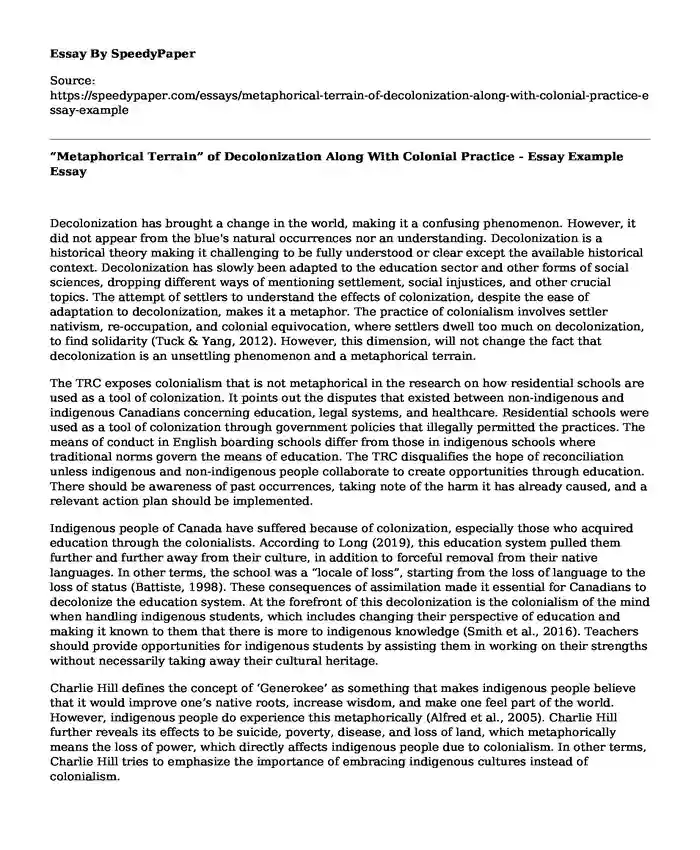Decolonization has brought a change in the world, making it a confusing phenomenon. However, it did not appear from the blue's natural occurrences nor an understanding. Decolonization is a historical theory making it challenging to be fully understood or clear except the available historical context. Decolonization has slowly been adapted to the education sector and other forms of social sciences, dropping different ways of mentioning settlement, social injustices, and other crucial topics. The attempt of settlers to understand the effects of colonization, despite the ease of adaptation to decolonization, makes it a metaphor. The practice of colonialism involves settler nativism, re-occupation, and colonial equivocation, where settlers dwell too much on decolonization, to find solidarity (Tuck & Yang, 2012). However, this dimension, will not change the fact that decolonization is an unsettling phenomenon and a metaphorical terrain.
The TRC exposes colonialism that is not metaphorical in the research on how residential schools are used as a tool of colonization. It points out the disputes that existed between non-indigenous and indigenous Canadians concerning education, legal systems, and healthcare. Residential schools were used as a tool of colonization through government policies that illegally permitted the practices. The means of conduct in English boarding schools differ from those in indigenous schools where traditional norms govern the means of education. The TRC disqualifies the hope of reconciliation unless indigenous and non-indigenous people collaborate to create opportunities through education. There should be awareness of past occurrences, taking note of the harm it has already caused, and a relevant action plan should be implemented.
Indigenous people of Canada have suffered because of colonization, especially those who acquired education through the colonialists. According to Long (2019), this education system pulled them further and further away from their culture, in addition to forceful removal from their native languages. In other terms, the school was a “locale of loss”, starting from the loss of language to the loss of status (Battiste, 1998). These consequences of assimilation made it essential for Canadians to decolonize the education system. At the forefront of this decolonization is the colonialism of the mind when handling indigenous students, which includes changing their perspective of education and making it known to them that there is more to indigenous knowledge (Smith et al., 2016). Teachers should provide opportunities for indigenous students by assisting them in working on their strengths without necessarily taking away their cultural heritage.
Charlie Hill defines the concept of ‘Generokee’ as something that makes indigenous people believe that it would improve one’s native roots, increase wisdom, and make one feel part of the world. However, indigenous people do experience this metaphorically (Alfred et al., 2005). Charlie Hill further reveals its effects to be suicide, poverty, disease, and loss of land, which metaphorically means the loss of power, which directly affects indigenous people due to colonialism. In other terms, Charlie Hill tries to emphasize the importance of embracing indigenous cultures instead of colonialism.
There is no specific way to approach decolonization and the effects of colonization and the road towards freedom. However, some steps can lead us towards freedom, especially for the indigenous people. First, people must return to their indigenous heritage and embrace their respective cultures. Besides, indigenous people must embrace their indigenous languages and forego the languages they adopted from colonialists. These strategies should be placed into practice by each individual in their specific manner, because of the particular setting and set of difficulties that structure every individual and network's frontier reality.
References
Alfred, T., & Corntassel, J. (2005). Being indigenous: Resurgences against contemporary colonialism. Government and Opposition, 40(4), 597-614.
Battiste, M. (1998). Enabling the autumn seed: Toward a decolonized approach to Aboriginal knowledge, language, and education. Canadian Journal of Native Education, 22(1), 16-27.
Long, B. S. (2019). CSR and reconciliation with Indigenous peoples in Canada. Critical Perspectives on International Business.
Smith, T. (2016). Make space for indigeneity: Decolonizing education. SELU Research Review Journal, 1(2), 49-59. https://selu.usask.ca/documents/research-and-publications/srrj/SRRJ-1-2-Smith.pdf
Tuck, E., & Yang, K. W. (2012). Decolonization is not a metaphor. Decolonization: Indigeneity, education & society, 1(1), 1-40.
Cite this page
"Metaphorical Terrain" of Decolonization Along With Colonial Practice - Essay Example. (2023, Dec 25). Retrieved from https://speedypaper.com/essays/metaphorical-terrain-of-decolonization-along-with-colonial-practice-essay-example
Request Removal
If you are the original author of this essay and no longer wish to have it published on the SpeedyPaper website, please click below to request its removal:
- Essay Example: In Searching of Writing Inspiration
- Scholarship Essay Sample to the National Health Service Corp
- The Importance of Reflective Learning - Essay Sample in Education
- Free Essay Defending the Twisted Novel
- Free Essay in Americah History: Underground Rail Road
- Essay sample about micro- and macro-dimensions in linguistic systems
- Essay Example. Personal Statement for Optometry School
Popular categories





